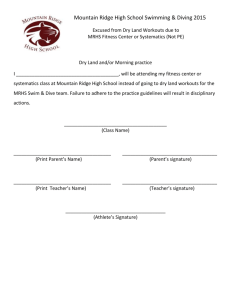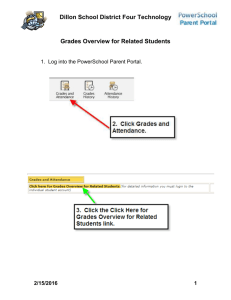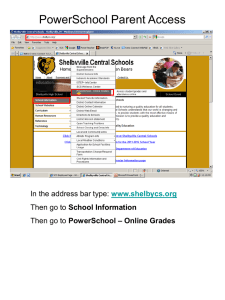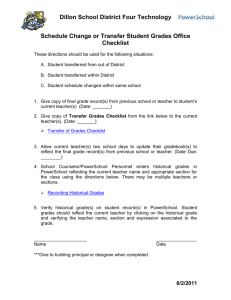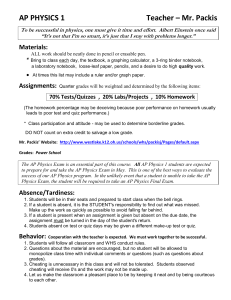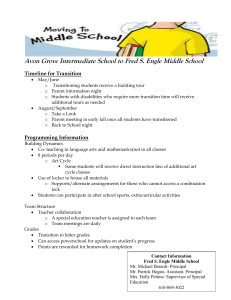Forensic Syllabus - Deer Valley Unified School District
advertisement
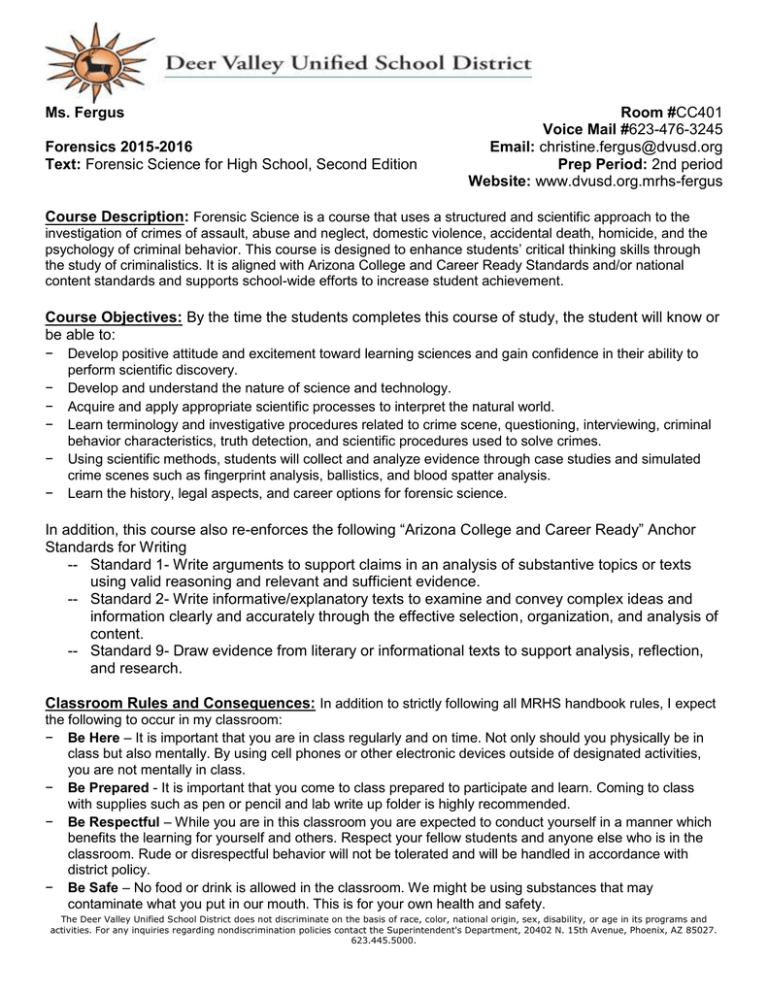
Ms. Fergus Forensics 2015-2016 Text: Forensic Science for High School, Second Edition Room #CC401 Voice Mail #623-476-3245 Email: christine.fergus@dvusd.org Prep Period: 2nd period Website: www.dvusd.org.mrhs-fergus Course Description: Forensic Science is a course that uses a structured and scientific approach to the investigation of crimes of assault, abuse and neglect, domestic violence, accidental death, homicide, and the psychology of criminal behavior. This course is designed to enhance students’ critical thinking skills through the study of criminalistics. It is aligned with Arizona College and Career Ready Standards and/or national content standards and supports school-wide efforts to increase student achievement. Course Objectives: By the time the students completes this course of study, the student will know or be able to: − − − − − − Develop positive attitude and excitement toward learning sciences and gain confidence in their ability to perform scientific discovery. Develop and understand the nature of science and technology. Acquire and apply appropriate scientific processes to interpret the natural world. Learn terminology and investigative procedures related to crime scene, questioning, interviewing, criminal behavior characteristics, truth detection, and scientific procedures used to solve crimes. Using scientific methods, students will collect and analyze evidence through case studies and simulated crime scenes such as fingerprint analysis, ballistics, and blood spatter analysis. Learn the history, legal aspects, and career options for forensic science. In addition, this course also re-enforces the following “Arizona College and Career Ready” Anchor Standards for Writing -- Standard 1- Write arguments to support claims in an analysis of substantive topics or texts using valid reasoning and relevant and sufficient evidence. -- Standard 2- Write informative/explanatory texts to examine and convey complex ideas and information clearly and accurately through the effective selection, organization, and analysis of content. -- Standard 9- Draw evidence from literary or informational texts to support analysis, reflection, and research. Classroom Rules and Consequences: In addition to strictly following all MRHS handbook rules, I expect the following to occur in my classroom: − Be Here – It is important that you are in class regularly and on time. Not only should you physically be in class but also mentally. By using cell phones or other electronic devices outside of designated activities, you are not mentally in class. − Be Prepared - It is important that you come to class prepared to participate and learn. Coming to class with supplies such as pen or pencil and lab write up folder is highly recommended. − Be Respectful – While you are in this classroom you are expected to conduct yourself in a manner which benefits the learning for yourself and others. Respect your fellow students and anyone else who is in the classroom. Rude or disrespectful behavior will not be tolerated and will be handled in accordance with district policy. − Be Safe – No food or drink is allowed in the classroom. We might be using substances that may contaminate what you put in our mouth. This is for your own health and safety. The Deer Valley Unified School District does not discriminate on the basis of race, color, national origin, sex, disability, or age in its programs and activities. For any inquiries regarding nondiscrimination policies contact the Superintendent's Department, 20402 N. 15th Avenue, Phoenix, AZ 85027. 623.445.5000. MRHS Laboratory Breakage Policy: The Mountain Ridge Science Department has a policy regarding the damage or breakage of laboratory equipment. In the event a student breaks any laboratory materials, that student will be responsible for paying the replacement cost of each item. A complete list of all laboratory materials and their costs are posted in each lab classroom. The students are taught proper procedures and laboratory etiquette to ensure the safety of our students during lab activities. This policy helps hold the students accountable for their actions and reinforces careful laboratory procedures. Plagiarism and Cheating: Plagiarism is the use of someone else’s work and reporting it as your own. This is cheating and will not be tolerated. Any assignments that are plagiarized, or copied from a classmate will not be accepted. There is to be no talking during a test. If you are talking for any reason, regardless if it is about the exam or not, your test will be confiscated and you will receive a zero. Grading: All grades will be rounded. This means that a 79.5% will be rounded up to an 80% and so on. The weight of grades within the course is as follows: tests, quizzes, and assessments = 50%, laboratory work, in-class work and homework = 30% and final exams are worth = 20% of your grade. The grading scale for the course is: 90-100% = A, 80-89% = B, 70-79% = C, 60-69% = D and less than 60% = F. There is NO extra credit at Mountain Ridge HS. Please remember that I do not give grades, I only record grades earned! Report Cards: In an effort to conserve resources and harness the capacity of our electronic grade reporting program (PowerSchool), district schools will no longer print hard copies of report cards unless requested by individual parents. To request a hard copy of your student’s report card, please contact the front office at 623-376-3000. To receive your PowerSchool login, please stop into the office with a valid photo ID. Power School Online Access: Grades and attendance may be accessed 24 hours a day online with your Power School access code. Access codes are available in the Counseling Office or Front Desk Monday – Friday 7:00 AM– 3:30 PM. You may check student progress regularly on the PowerSchool site using the same login for one or more students. For Mountain Ridge parents/guardians without home computer access, a computer with guest log-in capability is available in the Counseling Conference Room. Academic Assistance/Office Hours: In addition to the Academic Prep times built into our schedule each week, additional assistance/tutoring is provided on a weekly basis both by MRHS and individually by instructors. These office hours will be posted in the classroom and/or on my website at the start of each week. I will demonstrate to the students how to find my availability each week. I also encourage your son/daughter to write down my availability each week in their Mountain Ridge planner (provided by the school) so that you, too, are aware of my weekly availability. Absences: After an absence, a student has one school day for each day missed to make up work/tests, regardless of the number of days absent. If many days were missed, please schedule an appointment with me to formulate a plan for the completion of make-up work. Make-up work for extended absences (over 3 days) may be requested through the Counseling Office and picked up there. − Long-Term Projects: All long-term projects are due on the due date by 2:20 regardless if the student is in class or not. These projects will not be accepted after the due date. If it is not brought into class it is important to have the paper time stamped in the office. − Test Retakes: Students are given the opportunity to re-take ONE unit exam per semester in accordance with the following guidelines: • Student was present and completed the original exam on the original day it was given. • Student's re-take score and original test score will be averaged together • Student declares to teacher their desire to retest within one week of receiving original test back. − Absent on Test Days: If a student is absent the day before a test that student is still expected to take the test the following day. Students will be informed of tests at least 1 week before test day. If a student is absent on a test day, he or she will need to schedule a time to make up the test. Daily Device Use (iPads): Students should come to school with their iPads charged and ready to use in each class every day. Within each classroom, there are three possible technology environments. Teachers will identify for students the environment expected during their class period. These environments are described below: Red: No device use allowed. Devices are to be off and put away. If a device is out and being used at this time, students may receive disciplinary consequences and/or zeroes if appropriate. This environment may be necessary for testing or non-electronic based assessments. Black: Limited device use allowed. Students may use devices in accordance with teacher instruction in a prescribed manner. Students may be asked to place devices face down on their desk until appropriate to use. Teachers may ask to see students’ open apps and require that all apps are closed with the exception of a specific one or two. Games should not be open in this environment unless the teacher indicates a specific game may be used. Green: Open device use. Students may use their device independently to take notes, complete assignments, conduct research, communicate with the teacher, check grades, and other appropriate educational uses of the device. Students should not access inappropriate content or cause disruption in this environment. Devices may not be used to record or take photos of other people without their consent. Consequences for classroom disruptions and misuse of devices will follow a progressive discipline model, beginning with a phone call home and progressing to office referrals for repeated or more serious offenses. Students who have devices out during a Red environment or during testing, may lose credit on their test or quiz. See the Student Rights and Responsibilities consequence chart in the handbook for more specific descriptions of infractions and consequences.
